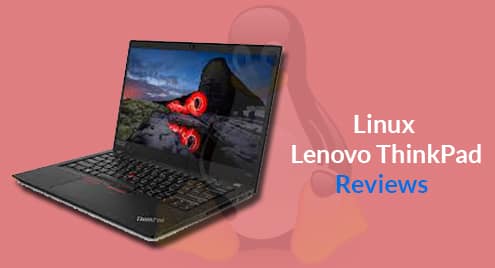Lenovo ThinkPad Linux Compatibility
Determined to maintain its position, Lenovo joined the Linux Vendor Firmware Service (LVFS) in August 2018, which means that many different Lenovo devices can now get automatic firmware updates through fwupd or in GNOME Software.
In addition to providing automatic firmware updates to Linux users, Lenovo has also shipped a number of ThinkPads with Ubuntu or Red Hat Enterprise Linux, and you can find hardware compatibility information for each Linux distribution on Lenovo’s official website.
For a detailed breakdown of individual hardware components found in Lenovo ThinkPad laptops and their Linux compatibility, we recommend the Lenovo page on the ArchWiki. The only ongoing source of compatibility problems is the fingerprint scanner, but new drivers are in the works.
How to Install Linux on a Lenovo ThinkPad
To install your favorite Linux distribution on a Lenovo ThinkPad:
- Create a bootable USB drive with your Linux distribution of choice.
- We recommend you create the USB drive with balenaEtcher, an easy-to-use, multi-platform, and open-source image burner.
- Restart your laptop.
- Press F1 at the ThinkPad logo during bootup to enter BIOS.
- If F1 doesn’t work try F2 or Enter.
- Navigate to the boot menu.
- Select the USB drive.
From there, follow your distribution’s installation instructions.
Best Lenovo ThinkPad Laptops for Linux
As we’ve already explained, ThinkPads, in general, are Linux-friendly machines that typically work great with most major Linux distributions. However, some ThinkPads that have become especially popular among Linux users thanks to their impressive performance, value, reliability, and, of course, Linux compatibility.
1. Lenovo ThinkPad T480
The Lenovo ThinkPad T480 is arguably the best productivity laptop you can get, offering dependable performance, impressive battery life, and wallet-saving durability in a highly portable package thanks to its 14-inch display.
Unlike many other 14-inch laptops, the Lenovo ThinkPad T480 won’t force you to carry an assortment of dongles with you everywhere you go because it provides a wide range of convenient ports, including a full-sized RJ45 Ethernet connector and a Thunderbolt 3 port.
Except for the laptop’s fingerprint reader, everything works right out of the box, including the 720p webcam and the Intel Dual Band 8265 Wireless AC adapter with support for Bluetooth 4.2.
2. Lenovo ThinkPad E590
The ThinkPad E series from Lenovo is aimed at small businesses and self-employed individuals who need a reliable laptop for work. With its 15.6-inch display, the ThinkPad E590 is one of the larger members of the E series, making it suitable primarily for stationary use and as a portable desktop replacement.
Lenovo understands that not all work happens in clean offices, which is why the ThinkPad E590 is able to pass strict thermal, vibration, and shock tests and function in extremely hot, dusty, and otherwise demanding environments.
When deciding which model of the ThinkPad E590 to buy, we recommend you avoid models with a spinning hard drive because it really holds the laptop back. Regardless with which model you go with, all hardware components should work flawlessly except for the fingerprint reader.
3. Lenovo ThinkPad X1 Carbon 7th
If you desire to own an ultra-portable Linux machine with enough processing power and battery capacity to keep you productive wherever life takes you, then you shouldn’t hesitate to add the 7th generation of the Lenovo ThinkPad X1 Carbon to your shopping cart.
This lightweight laptop weighs only 1.09 kg and is 14.9 mm thin despite lasting around 18 hours on a charge and rocking an 8th generation Intel Core processor with up to 16 GB of memory. You can choose between an impressively fine 4K display with HDR support, a touch-enabled Full HD display, and a Full HD display with PrivacyGuard technology, which narrows the display’s viewing angles to prevent strangers on a plane from seeing what you’re working on.
If you decide to go with the Full HD display with PrivacyGuard technology, you should keep in mind that it’s supported only in Linux 5.4 and newer.
4. Lenovo ThinkPad P53
For the times when regular laptops don’t cut it performance-wise, and desktop computers don’t cut it portability-wise, there is the ThinkPad P-series, whose members can only be described as mobile workstations characterized by desktop-level performance, military-grade durability, and expedition-grade battery capacity.
The ThinkPad P53 is a full-fledged desktop replacement with a stunning 15.6-inch display with 4K resolution, HDR, and DCI-P3 100% color gamut. The laptop can be equipped with the 9th generation Intel Core i7-9750H processor, Nvidia Quadro T1000 or T2000 graphics card, fast SSD storage, and ample memory.
The ThinkPad P53 can be purchased with Ubuntu 18.04 LTS (running the 4.15.0-1053-oem kernel), but it also works great with the latest version of the Linux kernel.
5. Lenovo ThinkPad X220 (Refurbished or Used)
First released in April 2011, the Lenovo ThinkPad X220 has aged gracefully, remaining one of the best ThinkPads for Linux. It stands out with its compact 12.5-inch display, which makes it a fantastic travel companion or network administrator’s best friend. Because the display has a relatively modest resolution of 1,366×768 pixels, the laptop is able to last over 20 hours on a charge if you really make every instruction cycle count.
Since this is a ThinkPad we’re talking about, you can look forward to a full-sized DisplayPort, RJ45 Ethernet connector, VGA output, combo audio jack, and three USB 2.0 ports. There’s also a docking connector that replicates all ports and lets you easily use the ThinkPad X220 as a desktop replacement at home or work with the Thinkpad X220 Ultrabase Docking Station.
The ThinkPad X220 has been around for a long time, so hardware manufacturers and the Linux community have had plenty of time to sort out even the smallest issues, resulting in a problem-free Linux experience.


